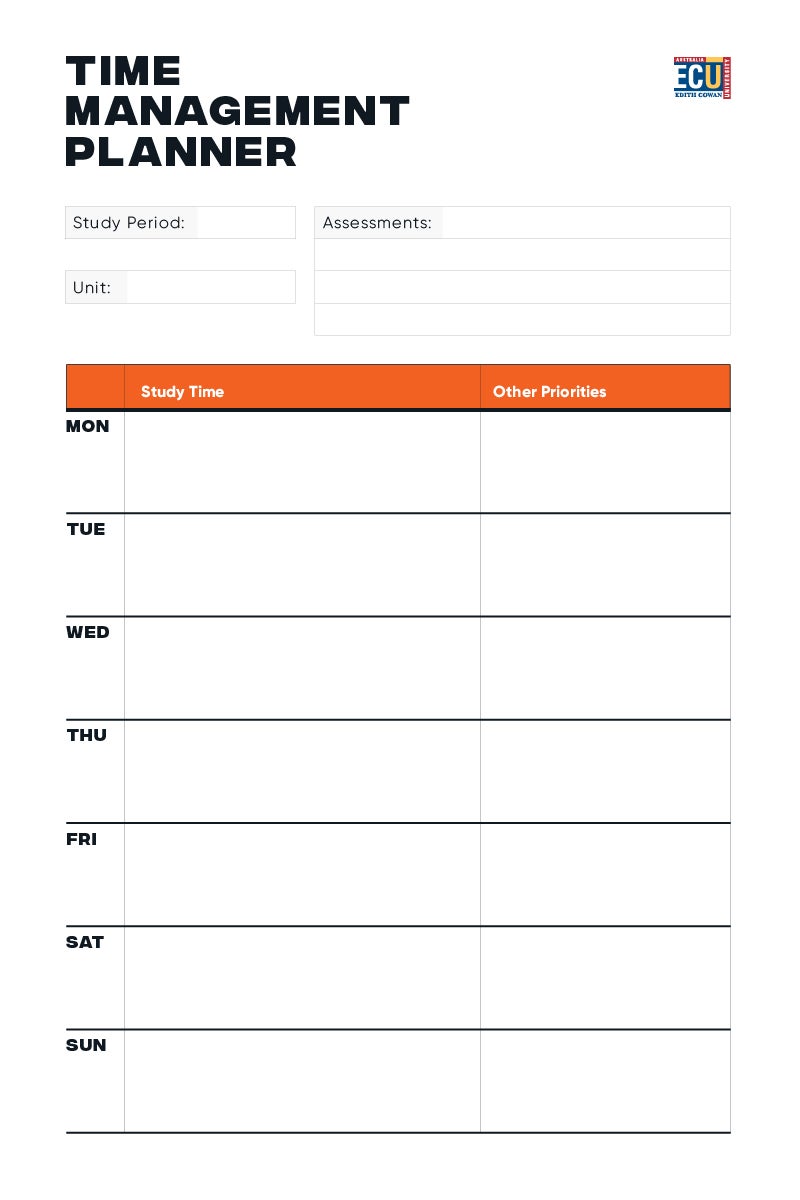
5 Time Management Strategies to Help You Reach Your Study Goals
How do you keep multiple things on the go while still managing to achieve your goals? The good news is that we all have the same 86,400 seconds in every day – it’s what we do with them that counts.
There’s a variety of time management tips that suit different personalities and situations. Here’s five of the best to help you reach your study goals.
1. Plan your week
Managing time is a bit like managing money – it helps to know how much you’ve got before you start spending it. So, begin your journey with a review of how you currently spend your time that reveals what your commitments are.
You can use the calendar on your phone or an app like RescueTime on almost any device to record how your time is spent both online and offline. Don’t worry, you don’t have to share your time log with anybody, so any little guilty pleasure is just for you to know.
Once you have an overview of where the sand in your hourglass is going, use a planner like the one below to simplify your time allocations into categories of study, commitments and non-negotiables.
Download your ECU Time Management Planner here.

At this stage, you might notice that you’ve been spending more time on priorities other than study. Leaving aside non-negotiables, which includes things like your job, it’s time to start negotiating.
You might shave off an hour of a priority like socialising with friends and allocate that hour to a study period. Use your planner to mix-and-match your time and continually massage it into something that is realistic and achievable.
Schedule in your assignment due dates, then work back from those dates to allow time to complete your assignment in good time. Ideally, you’ll never have to work into the wee hours to complete a project again.
Be kind to yourself. It will probably take a few weeks to get your planner just right. Life happens, so you may need to adjust it again.
2. The 5AM Club
If you’ve never heard of the 5AM club, the sad news is that it’s exactly what you think it is – people who get up at 5AM every single day. Now you might think this is a crazy way to squeeze a couple more hours out of the day, but there’s a little more to it than that.
Robin Sharma is the self-help expert who came up with the idea of getting up before the sun. And you’ll be encouraged to hear that after 22 years of setting the alarm clock for 4:58am, Sharma still hits snooze occasionally.
“I slip all the time. I think most people do,” says Sharma.
“There are temptations and distractions that get us off our habits and our priorities. Each day is simply about fighting the disruptive currents and getting back on track.”
The secret to the 5AM club is to start your day with Robin Sharma’s hour of power. First up you spend 20 minutes with high-impact exercise, then 20 minutes in low impact meditation. The last 20 minutes is for your growth – read a book, listen to a podcast, or anything else that improves your skills.
After that first hour, the rest of the day is yours to do as you please. Sharma recommends leaving your phone in another room while you sleep and don’t look at it until after your hour of power.
Another time management tip from the self-help guru is to focus your social media and news reading into a schedule, rather than endlessly scrolling.
If you’re still not convinced, a five-year study of 177 self-made millionaires found that half of them wake up at least three hours before their workday begins. Richard Branson rises with the sun, while Twitter’s Jack Dorsey starts at 5:30 with meditation and a long run.
If your time planner is looking a bit full with study, priorities and non-negotiables, then joining the 5AM Club could be the time management strategy that helps you reach your study goals.

3. The Pomodoro Technique
The Pomodoro Technique is time management for students – created by a student!
Just over 30 years ago, Francesco Cirillo challenged himself to work uninterrupted for 25 minutes. When he was successful, he gave himself a five-minute break, then started again.
When he completed four of these sessions in a row, he gave himself a half-hour break before coming back to his study.
To keep track of his time, Cirillo used a kitchen timer which just happened to be in the shape of a tomato, or in Italian, pomodoro. He could have called it the Kitchen Timer Technique, but Pomodoro Technique sounds much more appealing.
The beauty of the Pomodoro Technique is that the choice of reward is yours. Sure, you could scroll through Facebook in your five-minute window, but why not try stretching, making yourself something delicious to eat or even putting on your favourite song and dancing?
If you really want to take your time management strategies to the next level, take a leaf out of Dr Ruth Gotian’s book. Dr Gotian researches the secrets of success in high achievers and recommends aligning your Pomodoro Technique with other timers around the house.
“I recognised that I could work in tandem and use each laundry and dishwasher cycle as my timer. I put a load in, and in the time it would take for that cycle to finish, I would work,” Dr Gotian explains to Forbes.
Maybe we could call that the Lavanderia Technique – it’s Italian for laundry.
4. Make the most of every study period – including O-Week!
Studying online means that your Orientation Week is a little different to the traditional on-campus experience.
Before studying online, “I thought that Orientation Week was where you walked around and you looked at a few things and learned where the toilets were,” says Master of Cyber Security student Colin Twist.
For ECU Accelerated Online students, O-Week is when you have access to all of the learning materials for your studies.
Now that he’s more familiar with the accelerated learning environment, Twist recommends using O-Week to get in front of your workload for the semester.
“Whatever you can accomplish – you front load in those units as hard as you can. As soon as you get access to that material, go, go, go!” says Twist.
O-Week is also a great time to work on your planner and clearly block out time for study, priorities and non-negotiables. It’s also a great time to access your virtual classroom and digital learning environment - that way you can troubleshoot any technical issues and make sure you’re fully prepared for week one.

5. It’s okay to get stressed… learn how to use it to your advantage
No matter how many time management strategies you use, sometimes life feels like a series of deadlines that increase your stress levels one after the other. The good news is that it’s okay to get stressed – the important thing is to do something about it.
Psychologist Dr Mandie Shean is a lecturer in the School of Education at ECU and an advocate for renovating our relationship with stress.
“A stress response is helpful as it can increase oxygen to the brain and improve attention, focus, energy and determination,” writes Dr Shean in The Conversation.
Stress turns bad when we perceive a challenge as a threat, such as a rapidly approaching deadline – particularly if it’s one that we forgot to prepare for.
Dr Shean offers four tips to use stress to your advantage.
1. “Read your body differently.”
When you feel the uncomfortable signs of stress, like an increased heartbeat, remind yourself that your body is getting ready to compete.
2. “Reframe the meaning of the stress-inducing event.”
If your assignment falls apart the day before it’s due, that doesn’t mean you’ll fail your studies or the hopes and dreams of your future. That assignment is one stride on a journey of many steps.
3. “Accept stress and negative emotions.”
A common approach to stress is to try to relax, reduce or ignore it, which emphasises the view that stress is bad. Instead, accept stress and negative emotions for what they are and try to use them to your advantage.
4. “Add to your resources.”
Make sure you have support systems, such as friends, family or your Student Success Advisor. It’s also important to ensure that your study habits are consistent and focused. That way, when you are feeling stressed, your support and study resources are there for you to draw on.
Make the most of your postgraduate study with ECU Accelerated Online
With ECU Online, you are supported throughout your studies. If you need assistance with time-management, reach out to your Student Success Advisor, who can help you keep motivated and achieve your goals.
Looking for more study advice? Here are our top ten tips for balancing study, work and family life.



